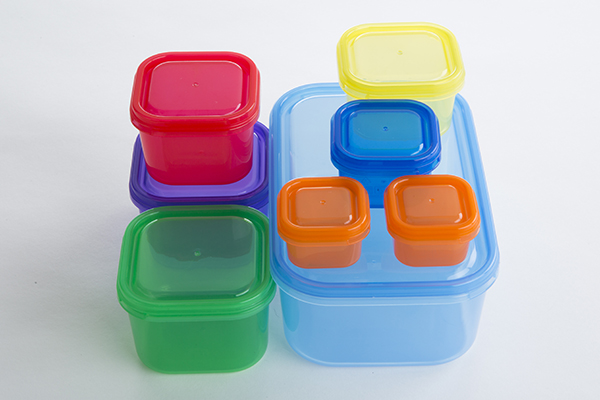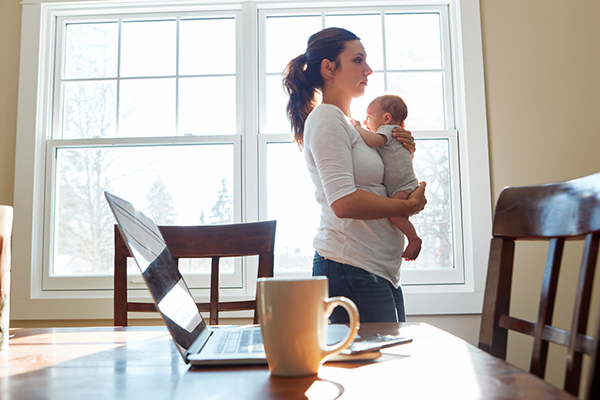New Mom’s Guide to Losing Baby Weight


2. Maintain a Balanced Diet
There are no “magic” weight-loss foods for new moms who are wondering how to lose weight after pregnancy.
Just like any other stage of your life, your post-pregnancy diet should be healthy and balanced.
Beachbody offers two nutrition programs to help take the guesswork out of healthy eating.
Portion Fix
Designed by Autumn Calabrese, Portion Fix uses a color-coded container system to help you get perfect portions and a healthy balance of macronutrients at every meal.
This can easily be adapted to meet the caloric needs of new moms.
If you feel like you need additional food on top of your calculated amount, simply add a container from each food group. Start with protein (red), followed by healthy fat (blue), carbs (yellow), fruit (purple), oil or nut butter, and veggies (green).
2B Mindset
2B Mindset relies on the “Plate It” method, a set of guidelines created by registered dietitian Ilana Muhlstein to help you develop a sustainable approach to healthy eating.
This can help you lose weight after pregnancy without feeling deprived.
Ilana also created 2B Pregnant, a nutrition program designed to help moms optimize their nutrition and thrive during and after pregnancy.
Whichever nutrition program you choose, you’ll get the tools you need to ensure your diet is healthy, balanced, varied, and — if necessary — adequate for lactation.
3. Get Moving
It’s important to incorporate fitness into your post-baby weight loss plan as well.
The American College of Obstetrics and Gynecology (ACOG) says it’s typically safe to start gently exercising a few days after an uncomplicated vaginal delivery. If you had a C-section or any complications, talk to your doctor first.
Walking is a great way to ease back into exercise after pregnancy, since you can listen to your body and adjust your pace as needed.
Or try a workout program like Pre & Post Natal Barre Blend, which features safe, effective, low-impact workouts designed for new moms.
4. Focus on Gradual Weight Loss
Slow and steady wins the race — especially if you’re breastfeeding.
Certain organic pollutants are stored in maternal adipose tissue, a.k.a. fat cells. According to one study, these pollutants may be more concentrated in breastmilk during weight loss.
However, the study notes that gradual weight loss of 0.5 kg per week — approximately one pound — is unlikely to change the concentration of pollutants enough to outweigh the benefits of breastfeeding.
Bottom line: There’s no reason to avoid breastfeeding while losing weight. Overall, the antibodies, nutrients, and other benefits of breastmilk far outweigh any potential risks.
Even if you’re not breastfeeding, gradual weight loss may be more sustainable than rapid weight loss. Experts recommend aiming for 1 to 2 pounds per week.

5. Stay Hydrated
Mothers often feel extreme thirst while nursing, so keep a glass or bottle of water by your side throughout the day, and drink enough to satisfy your thirst.
According to the Institute of Medicine’s Dietary Reference Intakes, adequate intake (AI) for water during lactation is 3.8 liters (about 16 cups) a day of total water. This includes the water in food plus 3.1 liters (about 13 cups) from beverages, including drinking water.
If you’re working out, you may need additional water, depending on your sweat rate and the intensity and duration of your workout.
Clear, light-colored urine can help indicate proper hydration.
6. Sip Coffee or Tea
Caring for a newborn can be exhausting. If you’re breastfeeding, you may be wondering if it’s safe to drink coffee or tea to help you power through your day or find the energy to work out.
According to La Leche League International, a little bit of caffeine shouldn’t pose a problem for most mothers and babies.
Just keep it to 200 to 300 mg of caffeine, or about 2 to 3 cups of coffee per day.
However, if you notice your baby is fussy or irritable, you may want to forgo the tea, coffee, chocolate, and other sources of caffeine.
7. Watch Your Alcohol Intake
According to the American Academy of Pediatrics, it’s advised to avoid habitual use of alcohol during the nursing stage.
However, moderate use with ample time before the next feeding or pumping — at least two hours after your last drink — will allow the body to process and rid itself of the alcohol.
But alcohol clearance time varies for each individual, so be mindful of your unique response.
In addition, alcohol can modify the taste of breastmilk, which your baby might reject. This could ultimately reduce his or her nutrient intake.
And even if you’re not breastfeeding, alcohol is a source of empty calories — so it’s always a good idea to limit your intake when you’re trying to lose weight.
8. Adjust Your Supplement Strategy
The intensity of your post-pregnancy workout routine may not constitute a need for any specific sports performance supplements — at least not at first.
However, it’s important to make sure you’re getting the nutrients you need after pregnancy.
Women who are nursing need additional vitamin A, folate, iodine, and zinc compared to non-pregnant/non-nursing women.
It’s also common for lactating women to fall short of the required intake of calcium, magnesium, and certain B vitamins.
Eating more food will help to supply the additional macro and micronutrients you need while nursing, as long as the meals are balanced and contain a wide variety of foods to supply a range of vitamins and minerals.
Your doctor may also suggest a post-natal multivitamin or specific supplements according to your personal health needs.
Nursing mothers should always consult their medical professional before beginning any fitness program or taking any supplement or meal replacement product (including those created by Beachbody, such as the Beachbody Performance line and Shakeology).
9. Give It Time
Some days, you may feel desperate to get your old body back — but it’s important not to put too much pressure on yourself.
Try to make slow, incremental changes as your body and mind adjust to this major life change.
Eating healthy and exercising will not only make you feel better in the long term, but it’ll also make you a better mom because you’re taking care of yourself.
What’s more, as your baby grows, he or she will see your active and nutritious lifestyle and learn healthy habits of their own — and that’s a gift that will just keep on giving.

No fitness and weight-loss plan is complete without nutritional adjustments.
But while your goal may be to get back to your pre-baby weight ASAP, the most important thing to consider at this time is fueling your body for this next stage of motherhood.
We’ve compiled these expert tips to help new mamas who want to know how to lose weight after pregnancy.
1. Increase Your Calories If You’re Breastfeeding
Fun fact: Your body uses more energy to produce a sufficient milk supply for your little one than it did throughout pregnancy.
Your body requires approximately 500 more calories per day while breastfeeding than your pre-pregnancy needs.
That’s about 200 calories more than your doctor likely advised you to consume during the second and third trimesters.
While it may seem counterintuitive to eat more calories when you’re trying to lose baby weight, research suggests breastfeeding may help reduce postpartum weight retention.
So when you’re figuring out your post-baby meal plan, make sure you’re getting enough calories to sustain yourself and your new little one.
Research suggests nursing moms who are trying to lose weight should consume at least 1,800 calories per day to ensure they’re meeting their nutrient needs.
When increasing your caloric intake, it’s best to introduce additional foods from all macronutrients instead of loading up on foods from just one category — no matter how hard that pancake or ice cream craving strikes!
If you’re using Portion Fix…
Need to figure out how many calories you need while breastfeeding and following Beachbody On Demand programs?
To lose weight while your workouts are Moderately Challenging:
To lose weight while your workouts are Extremely Challenging:
* If your maintenance calories or calorie target is less than 1,800 calories, round up to 1,800 to ensure adequate nutrient intake to meet your daily needs — especially if you’re within the first six months of breastfeeding (to ensure a healthy milk supply).